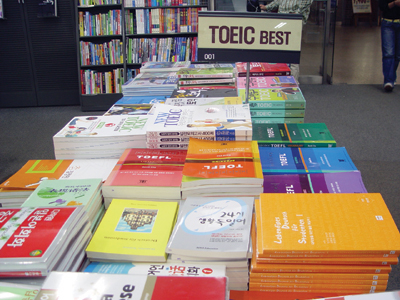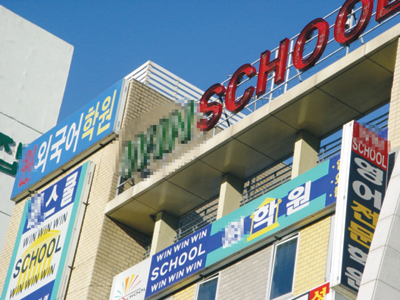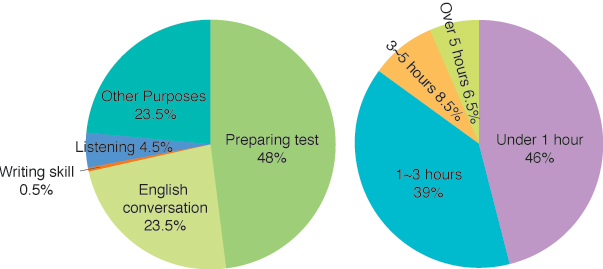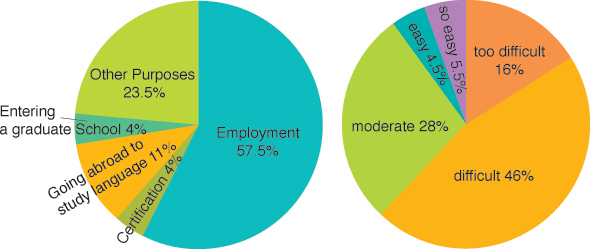
In Korea, there is a big fuss over English education. There is no age limit in learning English from preschool children to grandparents. Particularly, university students are struggling with English under the pressure of securing a good job in Korea.
The Yeungnam Observer (YNO) examined the current strength of this strong wind of English and checked for side effects. We also looked for ways to deal with related issues and help people understand real problems.

YBM, an English institute which started TOEIC lectures in 1989, is regarded as being the best FLI in Korea. Annually, the average number of people present at lecture classes is about one million.
The market for TOEIC books is ever expanding too. About three million books are sold yearly and the market size is estimated to be about 20 billion won. Lee Bo-young, a famous lecturer for English, established an English conversation club a year and a half ago. Now, she has over 400 branches due to the result of her popularity.
University students are no exception. Under the pressure of globalization, Korea University, one of the leading private universities in Korea, is known to have increased English language lectures by 30% to 60% and is planning to recruit extra foreign professors to a level whereby they amount to 10% of all professors. Keimyung University, another private university in Daegu, also established Keimyung International College (KIC) to encourage the development of English ability. At the International College, professors teach classes only in English. Other universities such as Yonsei and Hallym University already have a record of teaching all classes in English.

Company workers toil by day and study English at night. A study of 556 businessmen found that they consider English to be the most important area for work-related self-development (33.3%).
As previously stated, English has been sweeping over the Korean peninsular and people seem to prefer studying English to Korean. This English wave is not necessarily beneficial. First of all, the private education market has a disproportionate influence in relation to public education. The total budget of the Ministry of Education is 32 trillion won, but the private education market is estimated to be about 10 trillion won.
Have you ever heard of 'PELT', 'TOEIC Bridge', 'JET', 'Jr. G-TELP', or 'SEPT Jr.'?
They are all kinds of English tests for children. The number of children who took such tests is about 400 thousands, and 500 thousands in 2004 and 2005, respectively. Experts predict 700 thousand students will take tests this year. Because each test costs between about 17,000 won to 50,000 won, people on average incomes will have trouble in paying them. In addition, children can't go out to play due to the pressure of taking English tests. Tests to confirm their English ability become an enormous pressure.
This story has more shocking aspects. After the boom in early English education institutions for three- or four-year-olds, there are now famous royal institutions for one or two-year-old babies in Gangnam, and Bundang (located in or around Seoul). Those who live in the rich village employ excellent graduate students for their children. The misplaced competitive nature of parents takes early childhood English education to crazy levels of pressure for their children.
The field of tertiary education has problems too. Although students have different levels of English ability, universities simply force compulsory English language lectures upon students. In March, the Kodaeshinmoon, the vernacular newspaper published by Korea University, asked students, "Are you satisfied with English language lectures?". "No, I'm dissatisfied" was the largest grouped response (56%). The reason given was that the English language level was too high for the lecture to be understood (42.5%).
Korean language is so different from English that a foreigner who speaks in English can't easily understand what a Korean is saying. English language lectures, however, are only given in English, so it is natural that students can't understand the lectures. Some professors have also met with complaints for teaching Korean concepts by using the English language.
The problem lies, however, in not only English language lectures but also students. In the library, we see students studying TOEIC and TOFLE frequently apart from their specialized subjects. A few months ago, one research company asked university students: "What's the most important thing with regard to employment?" One common response was "English" (40%). They consider their English ability more important than their majors. This phenomenon is a result of the English winds of change, but, should TOEIC and TOFLE be the measuring stick of real English ability? We will return to this question later.
Do you know of disgraceful conduct which happened in the 'English town'? In wider Korean society, we notice the side effects of the English wind. It is widely known that there are many English institutions and English towns which employ unqualified foreign lecturers. But quite a number of them don't really care about who they are if they can speak English. The aforementioned conduct was caused by a native English speaker who had worked for Korean kids.
This shocking news does not end there. There are many native lecturers who work in many institutions without the government's permission. So the Korea Foreign Teacher Recruiting Association (KFTRA) announced the stablishment of a 'Black list' which tells tales upon unqualified native foreign lecturers. Korean netizens spoke out angrily because the penalties for "bad" lecturers were considered by them to be too lenient and weak. They believed that English language instructors should be firmly regulated.
Problems can be shown by scores obtained through the tests. Even though Koreans have invested much time and money into developing their English language ability, their level is known as being among the lowest in the world. The number of TOFLE testees is the highest; however, the average TOFLE score was 215 which is not good. Korea ranked the 93rd out of a total 147 nations. Frankly speaking, if we rank English efficiency according to the above method, it may be the lowest.
Why? What's the matter? We think that there are two major problems.
One is the prejudice of the Korean people. The other is Korean English education. Let's deal with the prejudice first. Ordinary university students think that a high TOEIC score and gaining entrance to a training program for language study are necessary for securing a job. They study hard for a good TOEIC score in the library and ask temporary absence from university to go abroad to study English. Is this appropriate? Lee Ik-hoon, a famous English educator, said there is little difference between real English ability as indicated in the TOEIC scores between 600 and 900s.
In other words, TOEIC is not an effective measuring stick for English ability. He said Korean people stand too much upon their dignity, and this will disturb the progress of their English ability. Always requiring a high grade is also a problem. Applicants who have low TOEIC scores don't even get a chance for an interview due to the widespread company policy. Many foreign affiliated members, however, don't have TOEIC scores. Research shows that 59.7% members have no good scores although they are very good at English, especially in terms of conversation.

YNO conducted an email interview and asked a high-school teacher some questions about English language education in Korea. The following interview is based on his answers.
YNO: Hello. What do you think of language education in Korea? What are the main features?
Teacher: English is a subject which is absolutely necessary for university entrance. Though the Korean educational system has a competitive style, it doesn't work well because schools are teaching students how to get high scores, not promoting students' ability in English.
YNO: What is your impression of students' attitudes towards English classes?
Teacher: In English classes, students are usually silent. Simply, they are trying to learn skills to understand basic conversations. Higher grade students spare a lot of time to study English compared with other subjects because they heard so often that English is important. But I don't think they know the real reason why they study English.
After finishing the interview, he offered a final statement. "If we don't change the ways of this English education system which is focused on the university entrance exam grades, the results will be terrible and the whole national effort to teach English will be a great waste of time and effort."
YNO looked next at the state of some of English language education in some countries neighboring Korea. China and India are strong nations in English fluency. The Chinese diplomatic service is famous for speaking English very well, virtually like native speakers. Furthermore, they don't go overseas to study English. India is similar. Both nations have their own reasons for their high levels of proficiency, but, a solid educational grounding which contributes to students' English ability might a crucial factor. Indian high school students take classes taught in English, and so most Indian university students have no problem in speaking English. Although their pronunciation is unique, they have pride in their own style of speaking English and don't hesitate to converse naturally; but Korean students are often afraid of speaking English because of their fear of mispronunciation.

We often see people studying only for an English test, but such a test can't be the best indicator of real English ability. To take TOEIC as one particular example, this system can give a high grade to those who study only TOEIC grammar and listening, even though they are bad at speaking and writing.
Prof. Chung said the changed TOEIC that includes speaking and writing is a positive step in the right direction. Prof. Chung further offered advice on another aspect of our English education. He said that early English education is good for children up till about eleven years old. The reason is that they have relatively small reactions to studying English, especially listening and pronunciation. But, he is afraid that Korea can't make sure of having a bright future of English education unless it resolves the issues of institutional inertia and the quality of schoolteachers.
He wants students to study English not only for the sake of getting higher scores in tests but for a practical use. He believes that tests should not be the final goal of English study.
As stated above, the trend toward learning English is growing in intensity, like a spring wind blowing over the Korean landscape; it will come to blow continuously unless we solve the problems which complement the public English education system, parent's excessive fixation on competition and institutes' own issues.
To overcome these challenges, we have to attract students who want to study English for fun. According to Prof. Chung, all Koreans should not use English at all. Let's think again as to why we have to study English.
Oh Nam-seok / namseok86@yumail.ac.kr


저작권자 © 영남대학교 언론출판문화원 무단전재 및 재배포 금지


